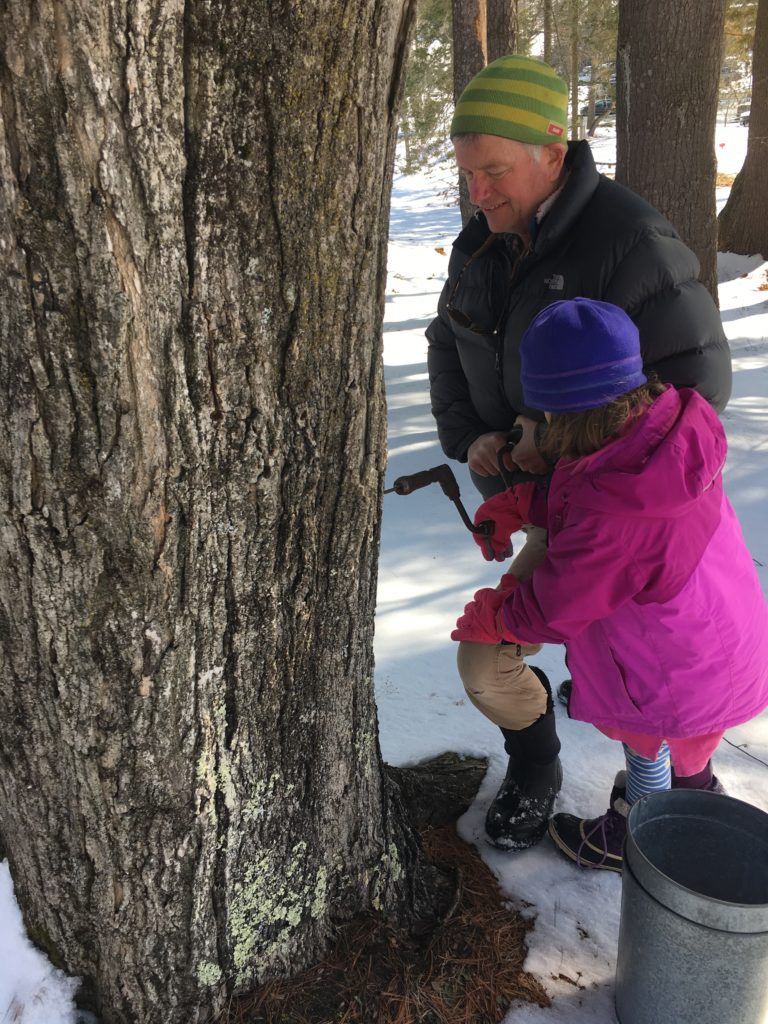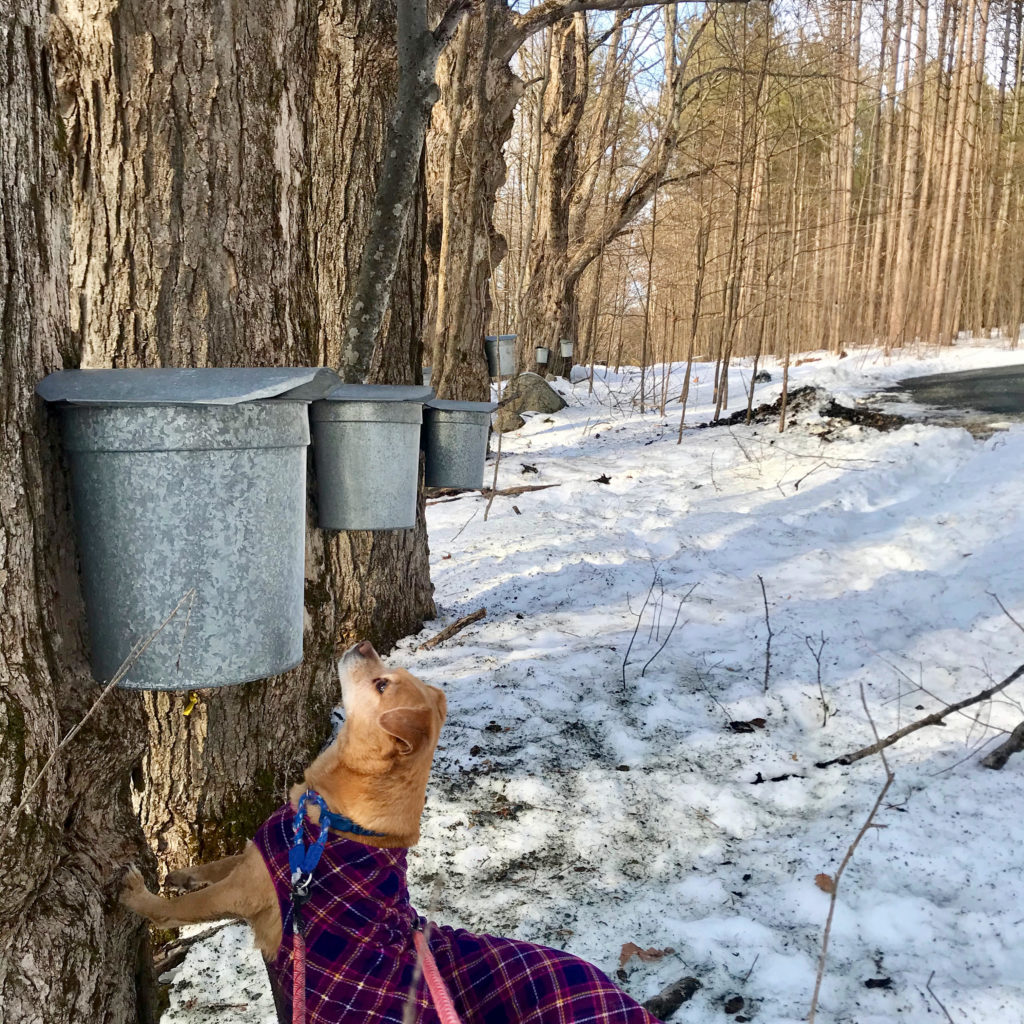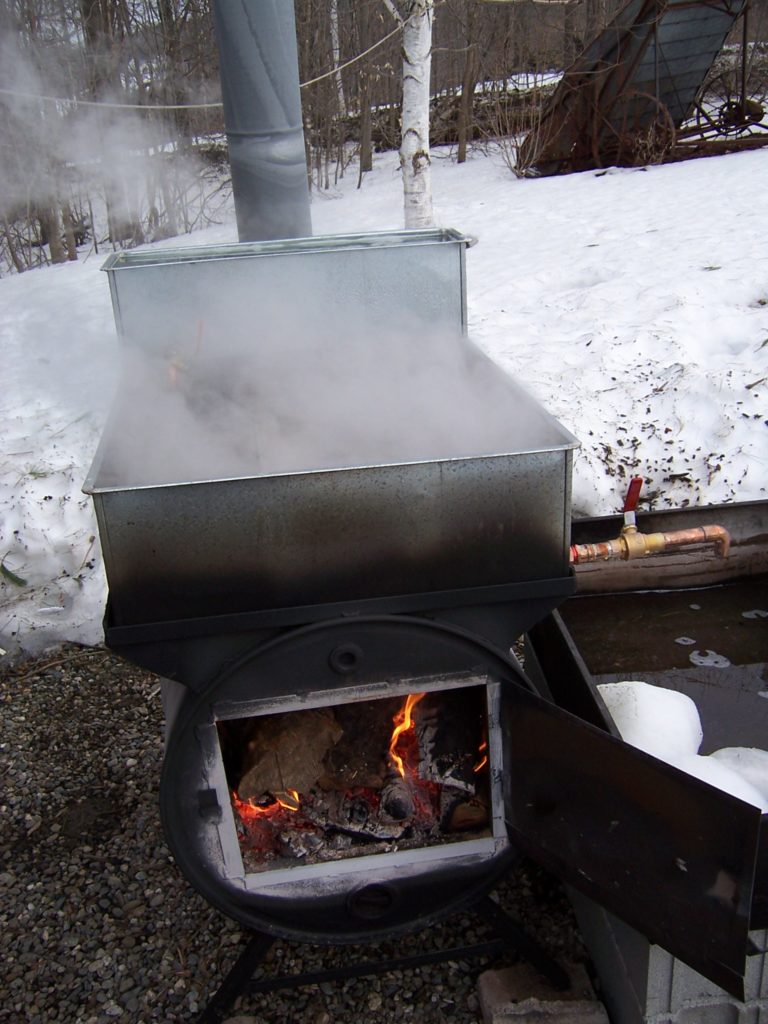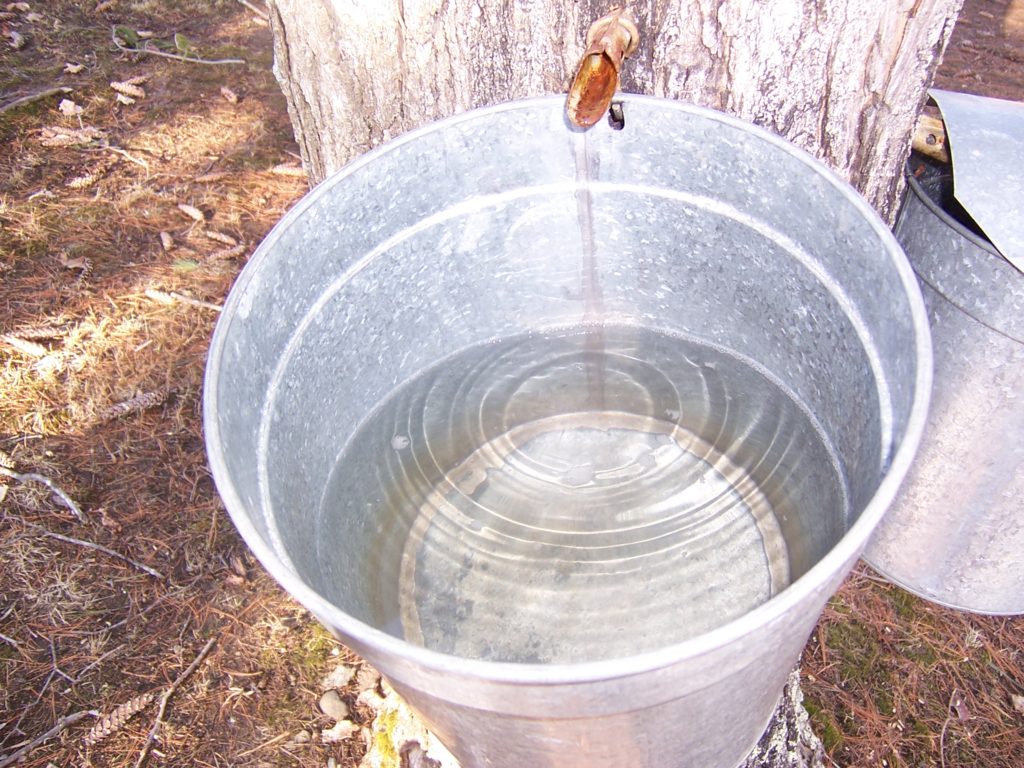Wow! What a show the moon put on for all of us this week. What intense beauty! I spent more time with the full moon this March than most months because it’s maple sugaring time here which means I am outside day and night enjoying the sky.
Maple sugaring is such a glorious, wonderfully messy and satisfying affair. And how lucky I am that it happens each year! Ours is a small maple sugaring operation. This size and our bootleg equipment make it what is known locally as a backyard sugaring operation.

We tap a lovely clutch of maple trees across the street from the farm and another group of old maple friends in our village. We “under tap” the trees which means we put very few taps into any tree. This year we had a neighbor who is a vascular surgeon help us tap and not surprisingly his taps are running well as he seems to have hit good veins in the tree. Jim does the lion’s share of drilling these taps with a lovely old hand held drill that his father gave him. I follow him around hanging the buckets and thanking the trees. We hang about forty buckets.

We usually tap late in February. Sometimes we get early runs then and sometimes things don’t really start until the middle of March. This year the season began early and has kept going strong.
Conditions have to be just right for a run of sap. The nights have to drop below freezing and the days have to get up into the 40’s. Brisk winds, too warm a night and other factors can stop the sap from running. But then as soon as one comes up with a theory about the whys of a good run, there will be a day when conditions don’t seem right at all, and the buckets will be spilling over with sap.

When the sap runs, we collect it in a holding tank that sits in the back of Jim’s ancient farm pick up. I am in charge back here with boiling the collected sap down to make into syrup. It takes about 40 gallons of sap to make a gallon of syrup. We make ten to fifteen gallons of syrup each year depending on the vagaries of the season. While we feel quite blissed out when we have a big season of fifteen gallons, our numbers stand in stark contrast to staff goddess Emily McNamara’s family operation. They make upwards of ten thousand gallons of syrup at their sugaring operation each year, and while my evaporator is a small tin contraption that sits outside on a half barrel fire box, the McNamara evaporator is the size of a freight engine and takes logs taller than me!

Staff goddess Vicki also has a bootleg operation of her own. She and her family make about the same amount of syrup as us. This morning Vicki and I were chatting about our big haul of three gallons of syrup to date and sweet Emily quietly reported yesterday’s yield over at their place was 475 gallons.
Even if I made no more than a pint of syrup a season it would be worth it to me, because gosh, what a great excuse to be outside feeding a raging fire. Plus, maple sugaring taps me into all these wonderful spring moments. When I hear the honking of Canada geese, I just look up from the evaporator to see them all flying north in their V formations. On trips from wood pile to fire box, I watch clouds and smoke merge in the skies above the evaporator while at my feet, I get to welcome each Crocus and Snowdrop that appears as the snow melts. The season finishes with the arrival of red winged blackbirds and spring peepers. Does it get any better than this?
But back to this full moon and its particular luminosity, it reminded me of the light pouring into creation this spring. This light feels very strong, stronger than just the return of spring light. When I sit in quiet to welcome this light into every cell of my being, I am startled by its brightness and fullness and strength. It floods me with hope and gratitude. And it keeps me returning inward to work on grounding this light within myself and in the Green Hope energy grid.
This going inward is not such an alien activity during sugaring season. I think it is pretty much a natural part of sugaring.
Most traditional New England sugaring operations boil their sap in an enclosed building with the boiling done at night. There are practical reasons for the night boils. The fire burns hotter in the night’s cold so the sap boils off faster. But there is also a great culture that goes along with night boiling. When I was a teenager, I helped at a sugarhouse where everyone sat around the evaporator at night watching the boil. There was chatter, but there was also a lot of quiet. Everyone seemed to go inward into the last dreaming before the big, busy push of spring.
I liked this meditative mood then, and I still like it. I try to use pretty much everything that happens to motivate me to go inward, so I like it when an activity naturally sends me this direction, and watching sap boil definitely does this.
I don’t go inwards to run away or game the system. When I was younger, I probably thought that going inwards and following the guidance I received there would always make things go better. Now, I still feel going inwards is the answer, but experience has tempered my belief that my efforts to go inward will spare me all sorrows.
I’m motivated to go inwards because it is the only place I know offering timeless calm, light, peace and serenity no matter what is going on around me. The eternal verities that infuse our world with things like full moons and geese in formation are like a stream taking me to the sea. Inwards is the sea. Inwards is the place where I feel our indivisibility and everything dissolves but love.
When an attitude of separation creeps back in, going inwards helps me let that go. We are all in this together. We are all one.
During this time of clamoring news pulling us into a sinkhole of fear, I have used every tool in my toolbox to stay on this inward trajectory. My main tool is to slow down my external life even more than usual. And that is saying something, because for many years, I have had what most people would consider a slowed down life. Not much travel. Most days spent at the farm. When I say a trip to the post office is a big outing, people think I am joking. I am not.
How on Earth did I come to live this slow life? It began decades ago because one of my children almost always screamed loudly and continuously when we left the farm. He did this FOR FIVE YEARS.
After those years, I was in the habit of asking the still small voice of my heart, “How is it going to go for us if we go to the grocery store right now?” I had learned to listen to the guidance because of the disasters when I didn’t. By the time this child outgrew his aversion to life beyond the farm, I was used to always seeking guidance about what to do or not do. Oddly, even after he was happy to leave here, my directions remained mostly some variation on, ‘Stay home.”
In my quieter life, I am rarely bored. It is amazing how interesting life in the microcosm can be. Sometimes I am resentful of my peers with their endless conversations about their trips. Sometimes I am irritated by the cultural assumptions that traveling is necessary to a fulfilling life. Mostly I am awed and grateful for how much beauty and wonder unfolds literally at our feet.
I stumbled on writing this blog because I know a lot of people are temporarily having to live a quieter life, and I thought maybe sharing a bit about my experiences would be comforting.
When I think of small things that have made it easier for me to stay home, one of them is reading books from earlier generations, say those written in the 1930’s. Old books embody the pace of many generations ago- books like “The Herb of Grace” by Elizabeth Goudge- where most people stayed home as a matter of course. They help me feel it is not so strange to live such a slowed down life. They also give me a sense of other generations prevailing through challenges that we know in hindsight got solved but to them were as unknowable as the place we find ourselves in now. For example “The Herb of Grace” is part of a trilogy written before and during WW2 by an English writer. Each book grapples with the way the experience of another world war affects the characters, yet each is also about how the goodness in life goes on no matter the difficulties.
In her determined faith and deep enjoyment of the small pleasures of life, the grandmother of the trilogy, Lucilla, reminds me that life is wonderful no matter the challenges. None of us get out alive, so maybe its okay to simply enjoy the blessings of each day and deal with the dificulties as they arrive without going down the tubes in advance. Yes, I know I am in the high risk demographic for this bug, but would a consuming fear in any way help me or give my life more joy or meaning? I think not. I am just going to continue to savor the moon, boil the sap and leave the rest to Divinity.

